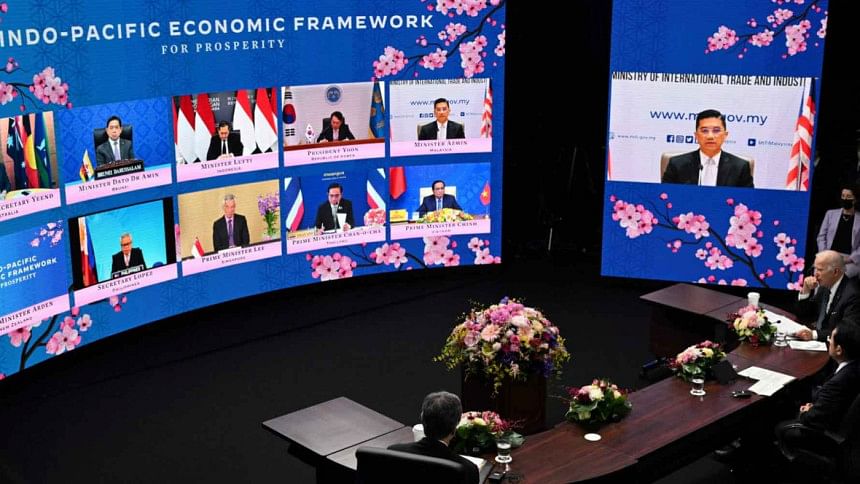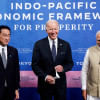IPEF has something in it for Bangladesh

It is now clear that Russia's invasion of Ukraine has thrown all post-Cold War calculations on global politics, geopolitics and the global economy, out the window. Along with severe disruptions in supply chains and the consequent cost surge, it has brought perceptions, and realities, of military security threats to the forefront.
As part of the fallout of the Ukraine war, countries like Finland and Sweden that had prided themselves for their historical neutrality from any institutionalised military alliances have signed up for joining Nato. Germany has committed itself to significantly raising its defence budget, with Japan very likely to follow suit. Clearly, its implications are not confined to Europe alone; the footprints are spread from the Global North to the South, from the West to the East.
While it is already evident that the aftershocks from the tectonic events in Europe will continue to reverberate round the world for the foreseeable future, for countries like Bangladesh, the economic fallout will bring forth multiple challenges – in fact, it already has.
Historically, Bangladesh has believed in the principle of safety in numbers, and for the right reasons. It is this that led Bangabandhu Sheikh Mujibur Rahman, as prime minister, to take Bangladesh to the Commonwealth as early as February 1972, to the non-aligned group of nations a year later, and to the OIC in 1974, the same year that Bangladesh proudly entered the United Nations as a full member. Promoting multilateralism through regional, subregional and transregional cooperation has been a motto for Bangladesh throughout its existence as a nation-state. It conceived the formation of Saarc in South Asia, and has been a founding member of Bimstec, a coupling of parts of South and Southeast Asia together. And has also been an active member of other such initiatives.
Regional and multiregional economic cooperation mechanisms are always a work in progress; they are a process, not an event. More often than not, outside factors make it necessary for course reset and a readiness to adapt to shifting regional and global factors. The war in Ukraine is one such factor.
Located strategically as it is on the top of the Bay of Bengal, Bangladesh is connected to the mighty Indian Ocean and, by extension, the Pacific. Economic cooperation in the vast maritime waters, therefore, is a logical choice for us. The recently announced concept of the Indo-Pacific Economic Framework (IPEF) can be one such choice.
As the very name suggests, the proposed IPEF is an economic forum that is expected to stand on four main pillars: economic connectivity, economic resilience, clean economy, and just economy. It is an important step towards trying to evolve a rules-based trading order that is inclusive and open to all the member states in the region.
Understandably, some have highlighted the IPEF as a Quad-plus initiative, simply because its launch was timed with the recent summit of Quad members in Tokyo. IPEF, however, needs to be viewed from a distinct perspective – as being tangentially unique from Quad itself. While initiatives like Quad and even the AUKUS, in recent times, have been looked at more from the perspective of enhancing security-driven aspects, the IPEF brings in a clear economic dimension that makes it relevant to the Indian and the Pacific Ocean and the Bay of Bengal littorals, of which Bangladesh is one.
Unlike the CPTPP or the RCEP, the IPEF is not a free trade agreement (FTA), but it provides a carte blanche to the member countries to choose what best suits their needs from the four pillars. So, there is a huge manoeuvring space within its parameters, which finds compatibility with the potential members. While the IPEF is very much a work in progress, it is undoubtedly an incremental step in the move towards a regional economic framework. Hence, it deserves serious consideration by Bangladesh.
Assuming that Bangladesh chooses to enter into consultations with others on the IPEF – and I think it should – the timing of expressing an interest is of critical importance. It is best to signal one's intentions when the proposed forum is at its formative stage. This will enable Bangladesh to play an important role in determining and defining the rules of engagement that will allow us to preserve and promote our national economic interests.
These may include, but need not be limited to, an inclusive framework for ensuring stability of supply chains, non-restrictive market access for its exports, multimodal and seamless connectivity, investments leading to job creation, and providing guarantee for manpower exports under legal frameworks.
If Bangladesh were to decide to sign up for serious consultations on the IPEF, it should do so without avoidable delay. Having established our credentials as a responsible regional player, the time has come for Bangladesh to seek an active role in the blue economy offered by the bay and the two mighty oceans.
Shamsher M Chowdhury, Bir Bikram, is a former foreign secretary of Bangladesh

 For all latest news, follow The Daily Star's Google News channel.
For all latest news, follow The Daily Star's Google News channel. 





Comments